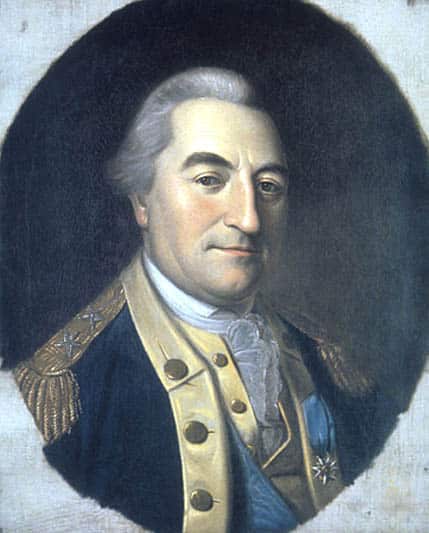Johann de Kalb was a Bavarian-French officer who served as a major General for the Continental Army during the American Revolutionary War. He was known as one of the best field commanders of the war and fell in battle due to incompetent leadership from Horatio Gates at the Battle of Camden.

Jump to:
Johann de Kalb Facts: Early Life in Europe
Kalb was born in Hüttendorf, a village near Erlangen, Bavaria, the son of Johann Leonhard Kalb and Margarethe Seitz. He learned French and English and had the social skills to earn a substantial military commission in the Loewendal German Regiment of the French Army. He served with distinguished honor in the War of the Austrian Succession in Flanders. During the Seven Years' War, he was promoted to lieutenant colonel and made assistant quartermaster general in the Army of the Upper Rhine, a division created by the disbanding of the Loewendal Regiment. He won the Order of Military Merit in 1763 and was elevated to the nobility with the title of baron.
Johann de Kalb Facts: Arrival in America
Johann de Kalb traveled to America in 1768 on a covert mission to gauge the temperament of the colonists. It was during that mission that de Kalb gained much admiration for the "spirit of independence" had by many Americans.
In 1777, he returned with his protege, Marquis de Lafayette. He and Lafayette took notice at the American spirit but realized quickly that the Old World they temporarily left behind was not completely gone from this aspiring country. Despite being one of the most qualified officers in the Continental Army, he was not given the position of major general. He was passed by in favor of others by the Continental Congress and was disgusted to the point of leaving. Lafayette was able to use his influence with George Washington to secure him an officers position within the army. Here, De Kalb believed he would be able to prove himself and gain that commission as a major general.
De Kalb was assigned to command a division of Maryland and Delaware troops, and he was ordered south to the Carolinas in command of these reinforcements. During the British southern campaign, he was disappointed to learn that Horatio Gates had been appointed to command instead of him. Gates led the army to a disastrous defeat at the Battle of Camden on August 16, 1780. De Kalb's horse was shot from under him, causing him to tumble to the ground. Before he could get up, he was shot three times and bayonetted repeatedly by British soldiers. His friend and aide, the Chevalier du Buysson, was seriously wounded, blocking additional blows with his own body.
Upon seeing de Kalb, Cornwallis told him, "I am sorry, sir, to see you, not sorry that you are vanquished, but sorry to see you so badly wounded." It is reported that Cornwallis supervised as de Kalb's wounds were dressed by his own surgeons in Camden, South Carolina. As he lay dying, de Kalb was reported to have said to a British officer, "I thank you, sir, for your generous sympathy, but I die the d**** I always prayed for the d**** of a soldier fighting for the rights of man." He died three days later and was buried in Camden.
Johann de Kalb Facts: Legacy
De Kalb is recognized as one of the best field commanders of the American Revolution. His appointment and end seem to be a disappointment and blessing.
One has to wonder, with his talents and charisma, what would have become of the Southern Army had he been appointed commander instead of Horatio Gates, but when he passed away, it secured the way for Nathanael Greene to take control of the Southern Army and change its strategy.
It speaks highly of his ability that Cornwallis recognized his greatness and was glad to see him out of the battle.
